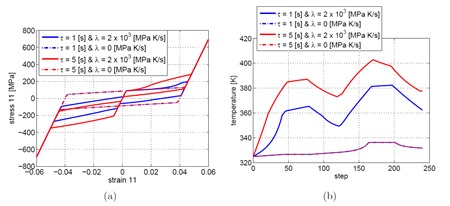- May 20, 2019
- Posted by: info
- Categories: Advanced Materials, Research
We investigate the variational structure of a phenomenological model for the coupled thermomechanical behavior of shape-memory polycrystalline materials. The nonisothermal evolution of the medium is reformulated as a generalized gradient flow of the entropy with respect to an entropy-production potential. Based on this reformulation, a semi-implicit time-discretization of the fully coupled thermomechanical problem is presented and proved to be unconditionally stable and convergent. The flexibility and robustness of the numerical method is assessed via both uniaxial and multiaxial computational tests.
 Figure 1. Comparison of the strain 11 versus stress 11 plots (a) and of the temperature trends (b) for changing rate and heat exchange coefficient.
Figure 1. Comparison of the strain 11 versus stress 11 plots (a) and of the temperature trends (b) for changing rate and heat exchange coefficient.References
- [P1] Ferdinando Auricchio, Elisa Boatti, Alessandro Reali, and Ulisse Stefanelli. Gradient structures for the thermomechanics of shape memory materials. Submitted to CMAME, 2015
- [R1] Alexander Mielke. Formulation of thermo-elastic dissipative material behavior using generic. Weierstraß-Institut für Angewandte Analysis und Stochastik, 1486:1–29, 2010.

